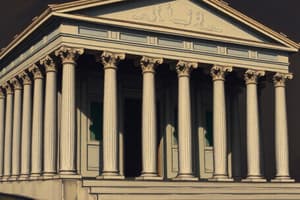Podcast
Questions and Answers
Qual era lo scopo principale dell'arte figurativa nell'antica Grecia?
Qual era lo scopo principale dell'arte figurativa nell'antica Grecia?
- Strumento di propaganda politica
- Decorazione degli edifici
- Espressione artistica personale
- Contesto religioso e funerario (correct)
Quale tecnica di ceramica era comunemente utilizzata per i grandi vasi come gli anfore?
Quale tecnica di ceramica era comunemente utilizzata per i grandi vasi come gli anfore?
- Ceramica a figure rosse (correct)
- Ceramica dipinta a mano
- Ceramica a figure nere
- Ceramica a figure bianche
Quale tipo di ceramica era tipicamente riservato per piccoli oggetti come le tazze?
Quale tipo di ceramica era tipicamente riservato per piccoli oggetti come le tazze?
- Ceramica smaltata
- Ceramica a figure nere
- Ceramica a figure bianche (correct)
- Ceramica a figure rosse
Quale grande esempio di arte figurativa è stato scoperto attraverso scavi archeologici in Cina?
Quale grande esempio di arte figurativa è stato scoperto attraverso scavi archeologici in Cina?
Quale aspetto della vita quotidiana nell'antica Grecia era collegato alla produzione di ceramica?
Quale aspetto della vita quotidiana nell'antica Grecia era collegato alla produzione di ceramica?
Quali tecniche diverse erano utilizzate nella produzione di ceramica greca in base allo scopo previsto?
Quali tecniche diverse erano utilizzate nella produzione di ceramica greca in base allo scopo previsto?
Quali materiali venivano comunemente utilizzati per creare sculture nell'antica Grecia?
Quali materiali venivano comunemente utilizzati per creare sculture nell'antica Grecia?
Quale ordine architettonico greco era caratterizzato da semplici capitelli e fregi decorativi sull'entablatura?
Quale ordine architettonico greco era caratterizzato da semplici capitelli e fregi decorativi sull'entablatura?
Quale di queste affermazioni riguardanti la scultura greca è falsa?
Quale di queste affermazioni riguardanti la scultura greca è falsa?
Quale di queste strutture architettoniche non si trova ad Atene?
Quale di queste strutture architettoniche non si trova ad Atene?
Quale affermazione riguardante la ceramica greca è corretta?
Quale affermazione riguardante la ceramica greca è corretta?
Quali culture influenzarono gli stili architettonici greci?
Quali culture influenzarono gli stili architettonici greci?
Flashcards
Greek Art Era
Greek Art Era
The period from prehistoric times (around 9500 BC) until 146 BC, known through surviving works found across Greece and its colonies.
Greek Sculptures
Greek Sculptures
Sculptures made from materials like marble, bronze, terracotta, or ivory, depicting gods, mythological creatures, or heroes.
Greek Architecture
Greek Architecture
Architectural styles featuring elements such as columns, pilasters, and pediments, influenced by Egypt, Persia, and other cultures.
Greek Pottery
Greek Pottery
Signup and view all the flashcards
Figurative Art
Figurative Art
Signup and view all the flashcards
Parthenon
Parthenon
Signup and view all the flashcards
Doric Order
Doric Order
Signup and view all the flashcards
Red-Figure Pottery
Red-Figure Pottery
Signup and view all the flashcards
White-Ground Pottery
White-Ground Pottery
Signup and view all the flashcards
Study Notes
Greek Art
Greek art spans the period from prehistoric times, around 9500 BC, until 146 BC. It is known primarily through surviving works found across Greece and its colonies, which were produced in a variety of media including terracotta, stone, metal, glass, ivory, and bronze. This article explores various aspects of Greek art, focusing on sculpture, architecture, pottery, and figurative art.
Sculpture
Sculptures, often depicting gods, mythological creatures, or heroes, were made from materials such as marble, bronze, terracotta, or ivory. They played an important role in the public domain of ancient Greece, where they served to convey both religious and political messages. Notable examples include the statue of Athena Parthenos from the Acropolis in Athens, which was one of many sanctuaries for the goddess Athena. The pedimental sculptures that decorated the temples also depicted scenes of mythology.
Architecture
Architectural styles varied across different regions of Greece, with influences from Egypt, Persia, and other cultures. However, there are some common elements found in many structures, such as columns, pilasters, and pediments. For example, the Doric order used in temples like the Temple of Olympian Zeus in Athens features simple column capitals and friezes decorating entablatures. Other notable architectural feats include the Parthenon, the Stoa of Attalos, and the Theatre of Dionysus in Athens.
Pottery
Pottery was a significant aspect of daily life in ancient Greece, serving functional purposes like storing food and water, as well as artistic expression. Different techniques were used depending on the intended purpose. For instance, red-figure pottery, characterized by black figures against a red background, was commonly used for large vessels like amphorae. Meanwhile, white-ground pottery featured white figures against a red ground and was typically reserved for small goods like cups.
Figurative Art
Figurative art encompasses a range of media like painting, metalworking, and stone carving, all of which have been discovered through archaeological excavations. This type of art was used primarily for religious and funerary contexts, reflecting both personal and societal beliefs about the afterlife. One of the most famous examples is the Terracotta Army of Xi'an in China, which includes thousands of life-sized clay soldiers buried alongside Emperor Qin Shi Huang.
In conclusion, Greek art reflects the cultural diversity, historical significance, and technical innovation of ancient civilizations. While much of this art has been lost over time due to various factors like erosion, warfare, and neglect, what remains speaks volumes about the society and values of Greeks during their influential period.
Studying That Suits You
Use AI to generate personalized quizzes and flashcards to suit your learning preferences.




